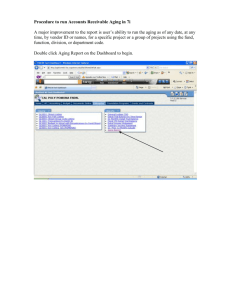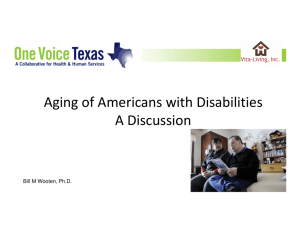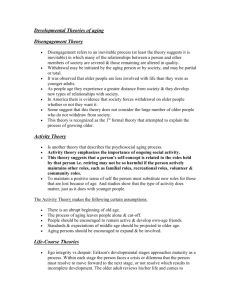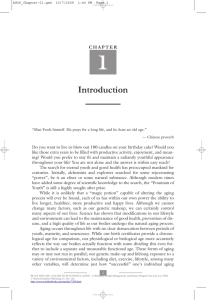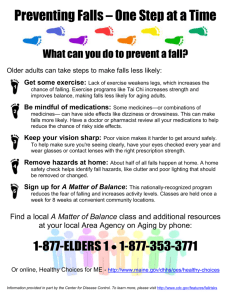(AAIDD) with Greater Boston Physicians for Social Responsibility
advertisement
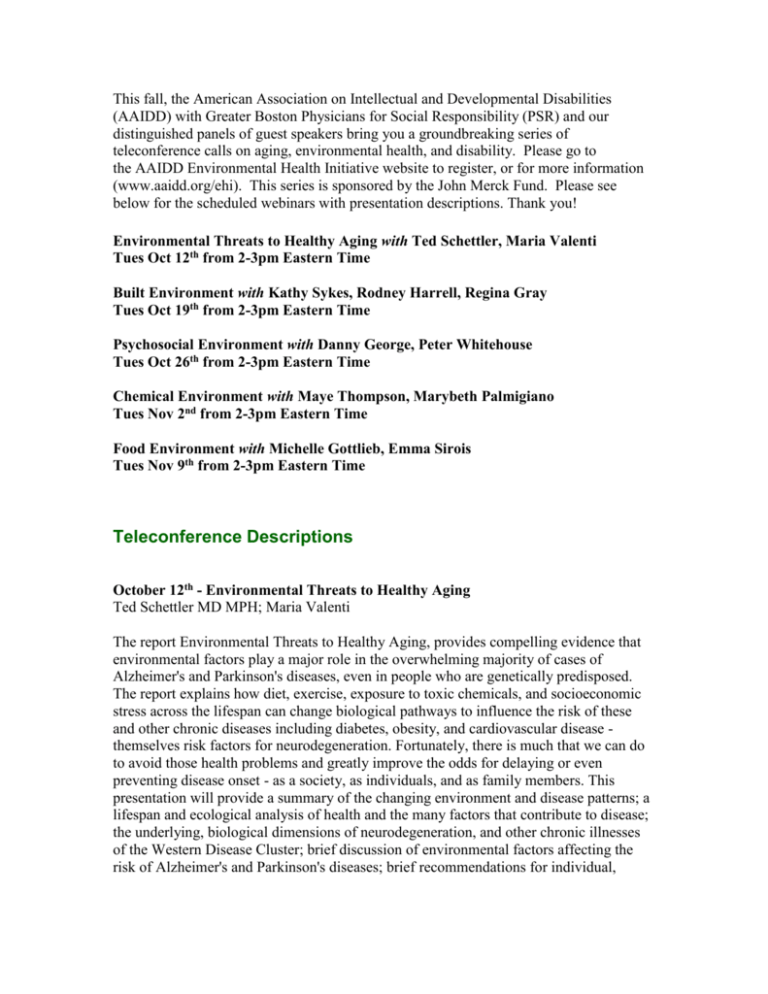
This fall, the American Association on Intellectual and Developmental Disabilities (AAIDD) with Greater Boston Physicians for Social Responsibility (PSR) and our distinguished panels of guest speakers bring you a groundbreaking series of teleconference calls on aging, environmental health, and disability. Please go to the AAIDD Environmental Health Initiative website to register, or for more information (www.aaidd.org/ehi). This series is sponsored by the John Merck Fund. Please see below for the scheduled webinars with presentation descriptions. Thank you! Environmental Threats to Healthy Aging with Ted Schettler, Maria Valenti Tues Oct 12th from 2-3pm Eastern Time Built Environment with Kathy Sykes, Rodney Harrell, Regina Gray Tues Oct 19th from 2-3pm Eastern Time Psychosocial Environment with Danny George, Peter Whitehouse Tues Oct 26th from 2-3pm Eastern Time Chemical Environment with Maye Thompson, Marybeth Palmigiano Tues Nov 2nd from 2-3pm Eastern Time Food Environment with Michelle Gottlieb, Emma Sirois Tues Nov 9th from 2-3pm Eastern Time Teleconference Descriptions October 12th - Environmental Threats to Healthy Aging Ted Schettler MD MPH; Maria Valenti The report Environmental Threats to Healthy Aging, provides compelling evidence that environmental factors play a major role in the overwhelming majority of cases of Alzheimer's and Parkinson's diseases, even in people who are genetically predisposed. The report explains how diet, exercise, exposure to toxic chemicals, and socioeconomic stress across the lifespan can change biological pathways to influence the risk of these and other chronic diseases including diabetes, obesity, and cardiovascular disease themselves risk factors for neurodegeneration. Fortunately, there is much that we can do to avoid those health problems and greatly improve the odds for delaying or even preventing disease onset - as a society, as individuals, and as family members. This presentation will provide a summary of the changing environment and disease patterns; a lifespan and ecological analysis of health and the many factors that contribute to disease; the underlying, biological dimensions of neurodegeneration, and other chronic illnesses of the Western Disease Cluster; brief discussion of environmental factors affecting the risk of Alzheimer's and Parkinson's diseases; brief recommendations for individual, community, and societal changes to prevent disease and improve the health of people and the planet. Ted Schettler MD, MPH is Science Director of the Science and Environmental Health Network (www.sehn.org). He has a medical degree from Case Western Reserve University, a masters in public health from Harvard University, and practiced medicine for over 30 years. Schettler also serves as science advisor for the Collaborative on Health and Environment Network and for the Health Care Without Harm campaign. He is co-author of Generations at Risk: Reproductive Health and the Environment (MIT Press 1999) In Harm's Way: Toxic Threats to Child Development (GBPSR 2000), and Environmental Threats to Healthy Aging (GBPSR/SEHN 2008). He has published a number of articles on related topics in peer-reviewed journals and has served on advisory committees of the US EPA and National Academy of Sciences. Maria Valenti has served in leadership positions with Greater Boston Physicians for Social Responsibility (www.psr.org/Boston) for the past two decades including as Executive Director and Program Director. She has helped develop and manage a number of national, multi-state projects that have provided educational materials and trained over 15,000 health professionals and others on environmental health issues. These include the In Harm's Way Training Program for Health Professionals, the Pediatric Environmental Health Toolkit (materials development, pilot study, training program, and online CE course), and most recently Environmental Drivers of Chronic Disease, focusing on healthy aging across the lifespan. She is a coauthor with medical experts of GBPSR's major peer-reviewed publications on environment and health including Generations at Risk: Reproductive Health and the Environment (MIT Press 1999, 2000), In Harm's Way: Toxic Threats to Child Development (GBPSR 2000), and Environmental Threats to Healthy Aging (GBPSR/Science and Environmental Health Network 2008). October 19th - Built Environment Kathy Sykes MA; Rodney Harrell PhD; Regina Gray PhD Can changes to the built environment improve health and well-being for older adults and persons of all ages? Can those changes also mitigate climate change and lead to greater sustainability. The presentation will explore the answers to those questions. It will examine threats to healthy aging in communities that include the physical and natural environments in which people live, work, study and recreate. We will look at air pollution, extreme heat events related to the built environment, drinking water contaminants, and conditions exacerbated by a poor or dangerous built environment including isolation and lack of physical activity etc. We will discuss strategies for interventions by government, the private sector and citizens including planning and design of "healthy" housing in advantageous locations such as near services and transit, building "Complete Streets" and connective street and transit networks, and fostering a healthier environment by reducing environmental health hazards, supporting environmental justice, and encouraging physical activity. In 1998, Kathy Sykes began working for the US EPA. In 2002, she began serving as the Senior Advisor for the Aging Initiative. She strives to raise awareness among older adults, and public health and aging professionals about environmental health hazards. She is committed to protecting the environment through smart growth practices. During her 24 year career, Ms. Sykes has held various health and aging policy positions at the state level and at federal agencies. She served as the Associate Director for Planning & Legislation for the CDC's National Institute for Occupational Safety and Health, as professional staff for the U.S. Special Committee on Aging, and as Associate Staff for Congressman David R. Obey. She worked as a special assistant for the Administrator of the Wisconsin State Division of Health. Kathy received a master's degree from the University of Wisconsin-Madison in Public Policy and Administration and Health Services Administration. She is a Fellow of the Behavioral and Social Science Section of the Gerontological Society of America. Dr. Rodney Harrell is the Senior Strategic Policy Advisor for Housing and Livable Communities with the Public Policy Institute at AARP. He is responsible for developing AARP's policies on housing and livable communities issues, managing the housing research agenda, and conducting independent research. Dr. Harrell is lead author of "Preserving Affordability and Access in Livable Communities: Subsidized Housing Opportunities near Transit and the 50+Population" and several other housing publications. Prior to working at AARP, he has worked as an independent research and evaluation consultant, as a researcher and instructor for the University of Maryland, and for the State ofMaryland on revitalization and housing issues. He graduated summa cum laude and Phi Beta Kappa from the honors program at Howard University, earned dual master's degrees in Public Affairs and in Urban and Regional Planning from the Woodrow Wilson School at Princeton University, and received a Ph.D. in Urban Planning and Design from theUniversity of Maryland, College Park. Regina Gray is an analyst for the Division of Affordable Housing Research and Technology Division in the Office of Policy Development and Research (PD&R) at the U.SDepartment of Housing and Urban Development. Since joining HUD in 2000, Regina's research activities have focused on sustainable development, urban design and land use planning, transit oriented development, energy and green building practices, and affordable housing preservation. Her work in these areas is closely aligned with the Obama Administration's sustainability goals. Beyond her work at HUD, Regina collaborates with other federal agencies on a host of sustainability initiatives, and is actively involved in these interagency efforts. She is the PD&R lead in supporting HUD's new Office of Sustainable Housing and Communities (OSHC) strategic planning efforts, integrating the goals and programs of partner federal agencies and stakeholder organizations. She also has had a key role in working with the Environmental Protection Agency on research related to smart growth, sustainable energy, and environmental planning. With the Department of Transportation's Federal Transit Administration (FTA), Regina is the co-chair of the FTA-HUD Working Group for affordable housing and transit. In addition, Regina is member of the HUD's partnership with the U.S. Department of Health and Human Services (HHS) on the HHS-HUD Partnership subgroup for Sustainable Housing and Healthy Communities, where she is working with the Centers for Disease Control (CDC) to help develop a health assessment impact tool. Most recently, she has collaborated with HUD's Office of Healthy Homes and Lead Control (OHHLC) and OSHC on the White House Interagency Task Force report addressing childhood obesity. Regina earned a Bachelors of Arts in Political Science from Emory University in Atlanta, Georgia; a Masters of Arts from the George Washington University in Washington, D.C. in Political Science and Public Policy; and a doctorate from the University of Maryland, College Park in Political Science and Policy Studies. In her off time, she enjoys running, biking, reading, music, and volunteering for various social and political causes. October 26th - Psychosocial Environment Peter Whitehouse MD PhD; Danny George PhD In this presentation we will explore the intergenerational approach to creating psychosocial learning environments and communities. Human beings, both in our evolution as hunter-gatherers and then in agrarian societies, have existed in communities composed of adults, children, and elders. Not surprisingly, a growing body of research demonstrates the bio-psychosocial benefits of intergenerational engagement for persons in their late life stages. However, urbanization and changing demographics in modern societies have served not only to intensify the environmental threats to healthy aging, but have also disrupted possibilities for human connection across the generations. We will review the relationship between psychosocial environments and brain health, but also focus on deeper and broader aspects of brain health including the strong and sustaining sense of purpose and usefulness that human beings manifest in community. We then turn our attention to current international efforts to develop intergenerational programs that support brain health and healthy aging, spotlighting our experiences at The Intergenerational School (TIS), a 10-year old public school in Cleveland, Ohio that provides a shared learning environment for children, young adults, middle-aged adults, and elders. We will review the evidence that this school benefits learners across the generations, particularly older persons with dementia. Finally, we will share our vision for a broader understanding of brain health, as manifest by our efforts to create intergenerational learning and wellness communities in Cleveland, Ohio and elsewhere. Peter J. Whitehouse, MD, PhD is Professor of Neurology and current or former Professor of Psychiatry, Neuroscience, Psychology, Nursing, Organizational Behavior, Cognitive Science, Bioethics, and History at Case Western Reserve University. He is a geriatric neurologist, cognitive neuroscientist, and deep bioethicist. He was trained at The Johns Hopkins University where he received his MD-PhD in 1976-7. His research has been supported by the NIH and many private foundations. He has made discoveries concerning the basic biology and clinical aspects of dementia. He is the coauthor of a book entitled The Myth of Alzheimer's: what you aren't being told about today's' most dreaded diagnosis (www.themythofalzheimers.com). He is evolving to become an integrative narrative evolutionary healer and maintain an active practice with elders facing cognitive challenges. His main passion is developing innovative learning environments to promote collective wisdom and contribute to planetary health. One prime example is The Intergenerational School (www.tisonline.org) which he founded with his wife Catherine, the current principal. He has also taught about leadership and ethics at Case in the medical and management schools and directed the undergraduate honors program. Dr. Daniel George is assistant professor of medical humanities at Penn State College of Medicine. He is coauthor with Dr. Peter Whitehouse of the book "The Myth of Alzheimer's: What You Aren't Being Told About Today's Most Dreaded Diagnosis." Together, he, Dr. Whitehouse, and several colleagues from Case Western Reserve Universityhave developed a Storybank alongside a planned university BioBank in Cleveland. November 2nd - Chemical Environment Maye Thompson RN PhD; Marybeth Palmigiano MPH Modifiable lifetime environmental factors that influence healthy aging include exposure to toxic chemi cals. The U.S. imports or produces approximately 42 billion pounds of chemicals daily. Synthetic chemicals contaminate every ecosystem - air, water, soil and food - in the world. Virtually all people and wildlife are regularly exposed to a complex mixture of industrial chemicals that did not exist before World War II. Studies of newborns' umbilical cord blood shows they have been exposed to industrial contaminants in the womb.Most industrial chemicals in the workplace and in consumer products have not undergone even basic toxicity screening. Only a few of 200 chemicals known to be neurotoxic to humans have been evaluated for their impacts on the developing brains of children or aging brains of adults. Data that do exist show that exposures to environmental chemicals can increase the risk of many diseases and conditions relevant to an aging population, including neurodegenerative disorders, cardiovascular disease, hypertension, and diabetes. In this presentation we will review toxic chemicals and their affect on health throughout the lifespan with a particular emphasis on obesity, diabetes, cardiovascular disease, and neurodegeneration including Alzheimer's and Parkinson's diseases. Additionally we will discuss current state and national efforts to reform chemical policy. Maye Thompson RN PhD is the Environmental Health Program Director at Oregon Physicians for Social Responsibility. In addition, she has worked with the Oregon Nurses Association, Northwest Coalition for Alternatives to Pesticides, Oregon Environmental Coalition, Health Care Without Harm and PSR. Her PhD in nursing focused on women's health and policy. Marybeth Palmigiano has been with the Physicians for Social Responsibility (PSR) organization for over 10 years. She has worked as a researcher, educator and advocate on issues and policies relating to the human health impacts of environmental chemical exposures. Most recently she has headed up an effort by the national PSR office to disseminate the Pediatric Environmental Health Toolkit (PEHT) nationwide and has launched a pilot initiative based on the PEHT in two states to educate farmworker families through Head Start Programs and Migrant Health Clinic Networks. She is also the Chapter Manager for the PSR Tampa Bay Chapter. Ms. Palmigiano received her Masters in Public Health from Boston University. November 9th - Food Environment Michelle Gottlieb MEM; Emma Sirois Healthy food is a vital component of healthy aging across the lifespan. A growing body of evidence indicates that numerous nutritional factors influence the risk of disease including neurodegeneration. They include saturated and trans fats, omega-3 and omega6 fatty acids, refined carbohydrates, antioxidants, and micronutrients. Specific dietary patterns can increase or decrease the risk of neurodegenerative diseases and diseases in the "Western disease cluster" of diabetes, cardiovascular disease and metabolic syndrome more generally. Trends in agriculture and food production over the past 50-100 yearsincluding agriculture heavily dependent on fossil fuels, factory farming, and rapid growth in consumption of fast foods and highly processed foods-have created a nutritional profile that is high in calories, saturated fats, refined carbohydrates, and omega-6 fatty acids and low in omega-3 fatty acids and micronutrients. This dietary pattern stimulates an inflammatory response in many tissues and organs. In this presentation we will review food trends and patterns across time, the benefits of a Mediterranean-type diet, and the benefits of sustainably produced food to individual health as well as the greater community, farmworkers, and food security. We will discuss the importance of healthy food in healthcare settings and provide examples of innovative programs in the health and educational sectors, including farm to hospital programs. Michelle Gottlieb, MEM is the co-coordinator of Health Care Without Harm's National Healthy Food and Healthcare Initiative, and the coordinator for the New England region. She also works with maternal and child health professionals on promoting healthier food systems and improving environmental health. Formerly she was the co-Executive Director of Greater Boston Physicians for Social Responsibility and helped develop a new program on Health, Environment, and Development at the World Resources Institute in Washington,D.C. Ms. Gottlieb holds a Master's degree from the Yale School of Forestry and Environmental studies. Emma Sirois is the Health Care Without Harm Program Director in Portland, Oregon. Health Care Without Harm is an international environmental health campaign working with hospitals to green their facilities and operations. Emma supports healthcare facilities throughout Oregon in implementing the HCWH agenda with educational and networking opportunities and collaborative pilots and direct technical assistance. Current project areas include: healthy food in hospitals, safer alternatives in healthcare devises, supplies and building materials, and healthy electronics management. Prior to joining the HCWH campaign in June of 2007, Emma worked in Arizona, building accessible and sustainable food resources and regional food systems. Emma holds a Master's in Urban and Environmental Planning from Arizona State University. Call Details TIME: 2-3pm Eastern Time (Please dial in a few minutes before 2:00 p.m. so we can start on time!) Moderator: Laura Abulafia, MHS MATERIAL: Go to the Initiative website at www.aaidd.org/ehi and click on the button that says next teleconference. There you will find the announcement with logistical information and the presentation under "materials" to down load or follow along on your computer. For more information on the teleconference series or AAIDD's Environmental Health Initiative, contact: Laura Abulafiaat Laura@aaidd.org or visit the website at www.aaidd.org/ehi. For more information on Greater Boston Physicians for Social Responsibility please contact Maria Valenti, Program Director, at mvalenti@igc.org. Thank you. Laura Abulafia, MHS Director, Education and Outreach Environmental Health Initiative (EHI) American Association on Intellectual and Developmental Disabilities (AAIDD) www.aaidd.org/ehi

